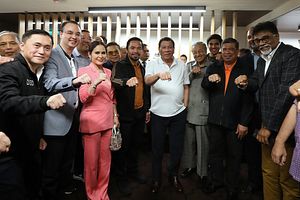On July 16, Philippine President Rodrigo Duterte met with Malaysian Prime Minister Mahathir Mohamad for the first meeting between the two leaders since Mahathir reassumed the premiership after a shock election win in May. Though the meeting produced little in the way of specifics, it nonetheless offered some insight into how relations might play out between the two Southeast Asian states moving forward.
As I have noted before in these pages, Malaysia and the Philippines, both members of the Association of Southeast Asian States (ASEAN), have long tried to forge greater cooperation to deal with a range of traditional and non-traditional threats – including terrorism, piracy, and illegal fishing – in spite of the differences that remain between them (See: “Warship Aid Spotlights Malaysia-Philippines Naval Ties”).
That pattern has continued in recent years. Periodic irritants have come up between the two sides, with a case in point being the Lahad Datu Incident in 2013 where over 200 descendants of the sultanate attempting to assert the Philippine claim to Sabah, leaving dozens of militants, civilians and Malaysian security forces dead. But collaboration has continued across a range of areas, including counterterrorism assistance that Malaysia provided to the Philippines following the siege in the southern city of Marawi by Islamic State militants as well as trilateral patrols in the Sulu Sea by the two countries as well as Indonesia.
Mahathir’s shock victory in Malaysia’s May election had raised the question of how collaboration would proceed between Malaysia and its regional neighbors, including the Philippines, as its foreign policy takes shape. And while there had been interactions between the two sides since Mahathir took office, the focus was on how Mahathir and Philippine President Rodrigo Duterte would get along and what that would mean for the relationship.
That opportunity finally came when Duterte visited Malaysia over the past few days, where he was from July 14 to July 16. Though the development that got by far the most attention was both leaders watching the boxing match featuring Philippine boxer and senator Manny Pacquiao, Duterte also subsequently visited Mahathir in his office in Putrajaya which gave them a chance to discuss the wider bilateral relationship as well.
Public Malaysian and Philippine official accounts of the meeting stressed that it was conducted in a warm and constructive manner, with both leaders reinforcing the longstanding relationship between the two sides. Ahead of the meeting, there had been speculation that the Sabah issue, long a thorn between the two sides, could be raised by Duterte, even though Philippine officials had denied this. Back in 2016, Duterte’s comments, where he appeared to recognize the claim of the sultanate of Sulu which had ruled over parts of Sabah before the British had transferred it to the Federation of Malaysia in 1963, had raised concerns in Malaysia and provoked a response by then-Prime Minister Najib Razak.
Substantively, the focus of the meeting between Mahathir and Duterte was particularly on security and defense issues within the bilateral relationship as well as broader geopolitical issues in the region. Philippine officials said the two leaders discussed issues including terrorism and violent extremism, transnational crime, illegal drugs, and piracy in the high seas. Duterte also expressed his appreciation for Malaysia’s support for peace and development in the southern Philippines, which has long been a manifestation of not just bilateral ties, but Malaysia’s wider regional role.
Few additional specifics were publicly disclosed in terms of what steps lie ahead for both sides, which is not surprising particularly since this is the first face-to-face meeting between the two leaders. But there is no shortage of issues for them to work on in the coming months, be it countering terrorism and violent extremism or building out trilateral cooperation in the Sulu Sea.













